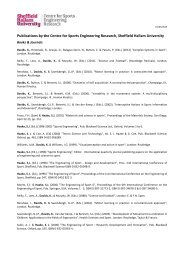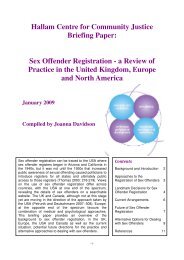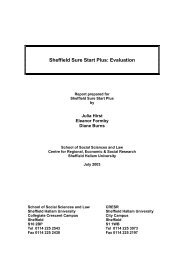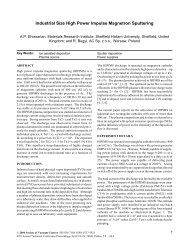The exercise of judicial discretion in rent arrears cases - Sheffield ...
The exercise of judicial discretion in rent arrears cases - Sheffield ...
The exercise of judicial discretion in rent arrears cases - Sheffield ...
Create successful ePaper yourself
Turn your PDF publications into a flip-book with our unique Google optimized e-Paper software.
Table 5: Changes <strong>in</strong> outcomes <strong>of</strong> <strong>in</strong>itial hear<strong>in</strong>gs between 1996 and 2004 studies<br />
Outcome DCA 2004<br />
Nixon et al 1996<br />
(n=540)<br />
(n=248)<br />
Outright possession 13% 11%<br />
Suspended possession 22% 61%<br />
Adjourned 55% 23%<br />
Dismissed/withdrawn/costs only 9% 10%<br />
<strong>The</strong>re are a number <strong>of</strong> factors which may be suggested to expla<strong>in</strong> these changes.<br />
First, s<strong>in</strong>ce 1996 the number <strong>of</strong> <strong>cases</strong> where hous<strong>in</strong>g benefit is an issue is likely to have<br />
<strong>in</strong>creased. Although it emerged as an issue <strong>in</strong> 1996 (see Nixon et al, p. 49), it did not do so<br />
nearly as strongly as <strong>in</strong> the cur<strong>rent</strong> study. We exam<strong>in</strong>e the impact <strong>of</strong> hous<strong>in</strong>g benefit on<br />
decisions <strong>in</strong> Chapter 7, below.<br />
Secondly, <strong>in</strong> the 1996 study a greater percentage <strong>of</strong> tenants who were represented by a<br />
solicitor or the duty desk obta<strong>in</strong>ed an adjournment. As the number represented <strong>in</strong> this study<br />
has <strong>in</strong>creased significantly, because <strong>of</strong> the presence <strong>of</strong> duty desks <strong>in</strong> the courts, it is likely<br />
that the number <strong>of</strong> adjournments would also <strong>in</strong>crease.<br />
Thirdly, a number <strong>of</strong> the claims <strong>in</strong>volv<strong>in</strong>g hous<strong>in</strong>g associations also <strong>in</strong>cluded claims based on<br />
Ground 8. Where the requirements for Ground 8 are made out the judge cannot grant a<br />
suspended possession order, and his/her choices are between an adjournment or outright<br />
possession (see further Chapter 8, below). At the time <strong>of</strong> the Nixon et al study <strong>in</strong> 1996, far<br />
fewer hous<strong>in</strong>g associations were us<strong>in</strong>g Ground 8, and accord<strong>in</strong>gly more suspended<br />
possession orders might be expected.<br />
F<strong>in</strong>ally and perhaps most significantly the adjournment has come to be used as a standard<br />
order for many judges <strong>in</strong> <strong>rent</strong> <strong>arrears</strong> <strong>cases</strong> (perhaps because <strong>of</strong> the factors outl<strong>in</strong>ed above).<br />
Many judges referred to us<strong>in</strong>g an adjournment on terms as a standard order, rather than a<br />
suspended possession order. For some this was a question <strong>of</strong> the level <strong>of</strong> <strong>arrears</strong> and it<br />
should be remembered that landlords are br<strong>in</strong>g<strong>in</strong>g <strong>cases</strong> to court with a lower average level<br />
<strong>of</strong> <strong>arrears</strong> (see above). If they are below a certa<strong>in</strong> level some judges consider that it is not<br />
reasonable to make a possession order at all, and an adjournment on terms is appropriate.<br />
One stated clearly:<br />
“I rarely make possession orders, suspended or otherwise for <strong>arrears</strong> below five<br />
hundred pounds." (DJ L)<br />
18
















